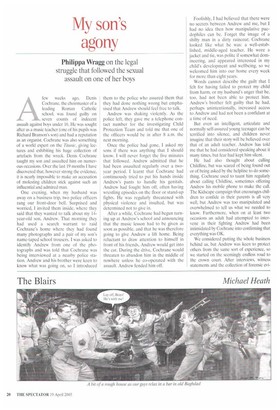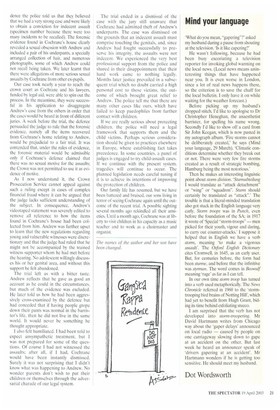My son's agony
Philippa Wragg on the legal struggle that followed the sexual assault on one of her boys Afew weeks ago, Denis Cochrane, the choirmaster of a leading Roman Catholic school. was found guilty on seven counts of indecent assault against boys under 16. He was sought after as a music teacher (one of his pupils was Richard Branson's son) and had a reputation as an organist. Cochrane was also something of a world expert on the Titanic, giving lectures and exhibiting his huge collection of artefacts from the wreck. Denis Cochrane taught my son and assaulted him on numerous occasions. Over the last 19 months I have discovered that, however strong the evidence, it is nearly impossible to make an accusation of molesting children stick against such an influential and admired man.
One evening, when my husband was away on a business trip, two police officers rang our front-door bell. Surprised and worried, I invited them inside, where they said that they wanted to talk about my 14year-old son, Andrew. That morning they had used a search warrant to raid Cochrane's home where they had found many photographs and a pair of my son's name-taped school trousers. I was asked to identify Andrew from one of the photographs and was told that Cochrane was being interviewed at a nearby police station. Andrew and his brother were keen to know what was going on, so I introduced them to the police who assured them that they had done nothing wrong but emphasised that Andrew should feel free to talk.
Andrew was shaking violently. As the police left, they gave me a telephone contact number for the investigating Child Protection Team and told me that one of the officers would be in after 8 a.m. the next morning.
Once the police had gone, I asked my sons if there was anything that I should know, I will never forget the five minutes that followed. Andrew admitted that he had been assaulted regularly over a twoyear period. I learnt that Cochrane had continuously tried to put his hands inside Andrew's pants to handle his genitals. Andrew had fought him off, often having wrestling episodes on the floor or stand-up fights. He was regularly threatened with physical violence and insulted, but was determined not to give in.
After a while, Cochrane had begun turning up at Andrew's school and announcing that the music lesson had to be given as soon as possible, and that he was therefore going to give Andrew a lift home. Being reluctant to draw attention to himself in front of his friends, Andrew would get into the car. During the drive, Cochrane would threaten to abandon him in the middle of nowhere unless he co-operated with the assault. Andrew fended him off. Foolishly. I had believed that there were no secrets between Andrew and me, but I had no idea then how manipulative paedophiles can be. Forget the image of a shifty man in a dirty raincoat; Cochrane looked like what he was: a well-established, middle-aged teacher. He wore a jacket and tie, was polite if somewhat domineering, and appeared interested in my child's development and wellbeing, so we welcomed him into our home every week for more than eight years.
Words cannot describe the guilt that I felt for having failed to protect my child from harm, or my husband's anger that he, too, had not been able to protect him. Andrew's brother felt guilty that he had, perhaps unintentionally, increased access to Andrew and had not been a confidant at a time of need.
But even an intelligent, articulate and normally self-assured young teenager can be terrified into silence, and children never imagine that their story will be believed over that of an adult teacher. Andrew has told me that he had considered speaking about it many times, but fear had kept him silent.
He had also thought about calling Childline, but was scared of being found out or of being asked by the helpline to do something. Cochrane used to taunt him regularly about calling Childline, sometimes offering Andrew his mobile phone to make the call. The Kidscape campaign that encourages children to confide in their parents is all very well, but Andrew was too manipulated and overwhelmed to tell us what we needed to know. Furthermore, when on at least two occasions an adult had attempted to intervene in their fighting Andrew had been intimidated by Cochrane into confirming that everything was OK.
We considered putting the whole business behind us, but Andrew was keen to protect others from the same sort of experience, so we started on the seemingly endless road to the crown court. After interviews, witness statements and the collection of forensic evi
dence the police told us that they believed that we had a very strong case and were likely to obtain a conviction for indecent assault (specimen number because there were too many incidents to be recalled). The forensic evidence found in Cochrane's house clearly revealed a sexual obsession with Andrew and included a pair of his underpants, a specially arranged collection of hair, and numerous photographs, some of which Andrew could not recall being taken. We later learnt that there were allegations of more serious sexual assaults by Cochrane from other ex-pupils.
Our case took nearly a year to reach the crown court as Cochrane and his lawyers, funded by legal aid, were able to spin out the process. In the meantime, they were successful in his application to disaggregate Andrew's case from the others in order that the cases would be heard in front of different juries. A week before the trial, the defence persuaded the judge to rule that the forensic evidence, namely all the items recovered from Cochrane's home relating to Andrew, would be prejudicial to a fair trial. It was contended that, under the rules of evidence, the forensic material would be admissible only if Cochrane's defence claimed that there was no sexual motive for the assaults; the Crown was not permitted to use it as evidence of motive.
As I now understand it, the Crown Prosecution Service cannot appeal against such a ruling except in cases of complex financial fraud where it can be argued that the judge lacks sufficient understanding of the subject. In consequence, Andrew's videotaped statement was severely edited to remove all reference to how the items found in Cochrane's house had been collected from him. Andrew was further upset to learn that the new regulations regarding young and vulnerable witnesses were discretionary and that the judge had ruled that he might not be accompanied by the trained witness supporter whom he had met before the hearing. No adolescent willingly discusses his or her genital area, and without this support he felt abandoned.
The trial left us with a bitter taste. Andrew reflects that he gave as good an account as he could in the circumstances, but much of the evidence was excluded. He later told us how he had been aggressively cross-examined by the defence but had conceded that if having people grope down their pants was normal in the barrister's life, then he did not live in the same world. It would never be something he thought appropriate.
I also felt humiliated. I had been told to expect unsympathetic treatment, but I was not prepared for some of the questions. Of course I had not witnessed the assaults; after all, if I had, Cochrane would have been instantly dismissed. Surely it was not surprising that I didn't know what was happening to Andrew. No wonder parents don't wish to put their children or themselves through the adversarial charade of our legal system. The trial ended in a dismissal of the case with the jury still unaware that Cochrane had admitted theft of Andrew's underpants. The case was dismissed on the grounds that an indecent assault must comprise touching the genitals, and, since Andrew had fought successfully to preserve his integrity, the assaults were not indecent. We experienced the very best professional support from the police and shared in their disappointment that their hard work came to nothing legally. Months later justice prevailed in a subsequent trial which no doubt carried a high personal cost to those victims, the outcome of which brought great relief to Andrew. The police tell me that there are many other cases like ours, which have failed to keep paedophiles from further contact with children.
If we are really serious about protecting children, the police will need a legal framework that supports them and the child victims. Perhaps serious consideration should be given to practices elsewhere in Europe, where establishing fact takes precedence. In some countries, a panel of judges is engaged to try child-assault cases. If we continue with the present system, tragedies will continue to occur. The planned legislation needs careful tuning if it is to achieve its intentions of improving the protection of children.
Our family life has resumed, but we have been battered and bruised, our sons living in terror of seeing Cochrane again until the outcome of the recent trial. A possible sighting several months ago rekindled all their anxieties. Until a month ago, Cochrane was at liberty to visit children in his capacity as a music teacher and to work as a choirmaster and organist.
The names of the author and her son have been changed.



































































 Previous page
Previous page